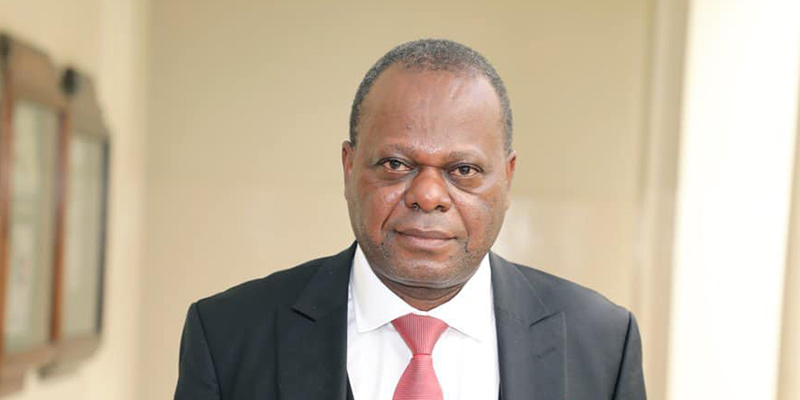An independent investigation by World Rugby in March 2016 laid to rest allegations that there was systematic doping of Kenyan players through food supplements. The allegation first surfaced in a 2014 report prepared by a committee under the chairmanship of Prof. Moni Wekesa, 62, who has applied for the position of Chief Justice.
The Kenya Rugby Union has used the opportunity of Wekesa’s candidacy for the position of Chief Justice to lay bare what it saw as the anomalies that cast the country’s best internationally performing ball sport in an unseemly light.
Oduor Gangla, the chairman of the KRU, told the Judicial Service Commission in a letter that the Wekesa committee reached summary judgments and conclusions without giving senior coaches an opportunity to explain themselves, that it refused to follow procedure, instead preferring hearsay and innuendo, and that it treated the sport causally.
Gangla adds that the committee used laboratories that were not accredited by the World Anti-Doping Agency, and did not handle the samples and the testing professionally. Wekesa’s promotion of his report in the media despite its shortcomings, argues the rugby union, means that he is singularly unsuited for high judicial office.
Complaints notwithstanding, Wekesa wears his credentials on his sleeve – especially the two doctorates and his professorship in law. His pride in chairing the national task force on anti-doping between 2013 and 2014 is evident in the publicly available résumé on the Daystar University website. He credits his tenure with the subsequent enactment of the anti-doping law in 2016 and the creation of the Anti-Doping Agency of Kenya the same year.
Wekesa’s impressive sports resume includes chairing the disciplinary committee of the Football Kenya Federation and the Kenya Premier League Ltd. In 2005, the international audit firm KPMG recruited him as the chief executive officer of Kenya Football Federation in an effort to normalise soccer management in the country, but some members of the KFF board rejected his appointment and locked him out of office.
Wekesa has been in the thick of things in the anti-doping world, serving as a member of the integrity unit of the Disciplinary Tribunal of the International Association of Athletics Federations (IAAF). He served as vice-chair of the Bioethics Committee of the National Commission of Science, Technology and Innovation between 2012 and 2018 and was a sports medicine consultant for the national football, hockey and volleyball teams between 1990 and 1995. Wekesa was also Africa Doping Officer for the International Football Federation and Confederation of African Football. Wekesa still sits on the Anti-Doping Committee of the International Federation of Sports for Persons with Intellectual Disabilities, and is a director at the Anti-Doping Agency of Kenya.
After launching the law school at Mt Kenya University as dean in 2010, Wekesa was forcibly removed from the institution in 2016, and lodged a KSh58.1 million wrongful dismissal case in court. He moved on to Daystar University where he founded the School of Law as dean.
Wekesa earned a first class honours Bachelor of Education degree from the University of Nairobi in 1981 before going off to study sports medicine at master’s and doctorate levels in Cologne, Germany, in 1986 and 1989, respectively. He served as Deputy Dean of Faculty at the University of Botswana from 1996 to 1997, as departmental chair of Human Movement Science at the University of Namibia in 1998 and as regional manager of Special Olympics International in charge of Africa between 1999 and 2001.
After reaching the pinnacle of academic achievement in sports medicine, Wekesa taught the discipline at Kenyatta University, University of Botswana, and University of Namibia before switching lanes to law. He earned a bachelor’s degree from the University of Nairobi in 2002, followed by a diploma in legal practice from the Kenya School of Law in 2003. He enrolled for a master’s degree in law, writing a thesis on legal issues in technology transfer in doping control in sports, which he was awarded in 2005. He earned a doctoral degree in law from the University of Nairobi by writing his thesis on the regulation of doping in sports in Kenya.
Wekesa has been an itinerant law lecturer at the Catholic University of Eastern Africa and at the Kigali Independent Universit in, Rwanda, as well as at the Lusaka University School of Law.
Wekesa’s consultancy portfolio includes Special Olympics Inc., formulating the Regulations for the Sports Registrar, drafting the Anti-Doping Bill, Policy and Rules for the Ministry of Sports, drafting the amendment law and regulations for the Kenya Nutritionists and Dieticians Institute, and writing regulations for the Kenya Academy of Sports and Sports Kenya among others.
Although he has no judicial experience, he has practised law since his admission to the roll of advocates in 2003 and has written on intellectual property, sports and elections. As part of his sample writings Wekesa has submitted a self-published book, two articles in refereed journals and submissions to obtain a student admission to the Kenya School of Law.
Wekesa indicates that he has been teaching Sunday school since 1976, and additionally claims his work as honorary legal counsel for the East African Universities Sports Federation since 2003, as founding council member of Friends University, Kaimosi, and as member of the council of Pwani University since 2017, as part of his community service.
Born in Kakamega County, Wekesa’s attempt to join the Supreme Court will likely be checked by the fact that the region already has a judge from his ethnicity in the person of Smokin Wanjala.
–
Back to: Kenya Chooses Its Next Chief Justice





